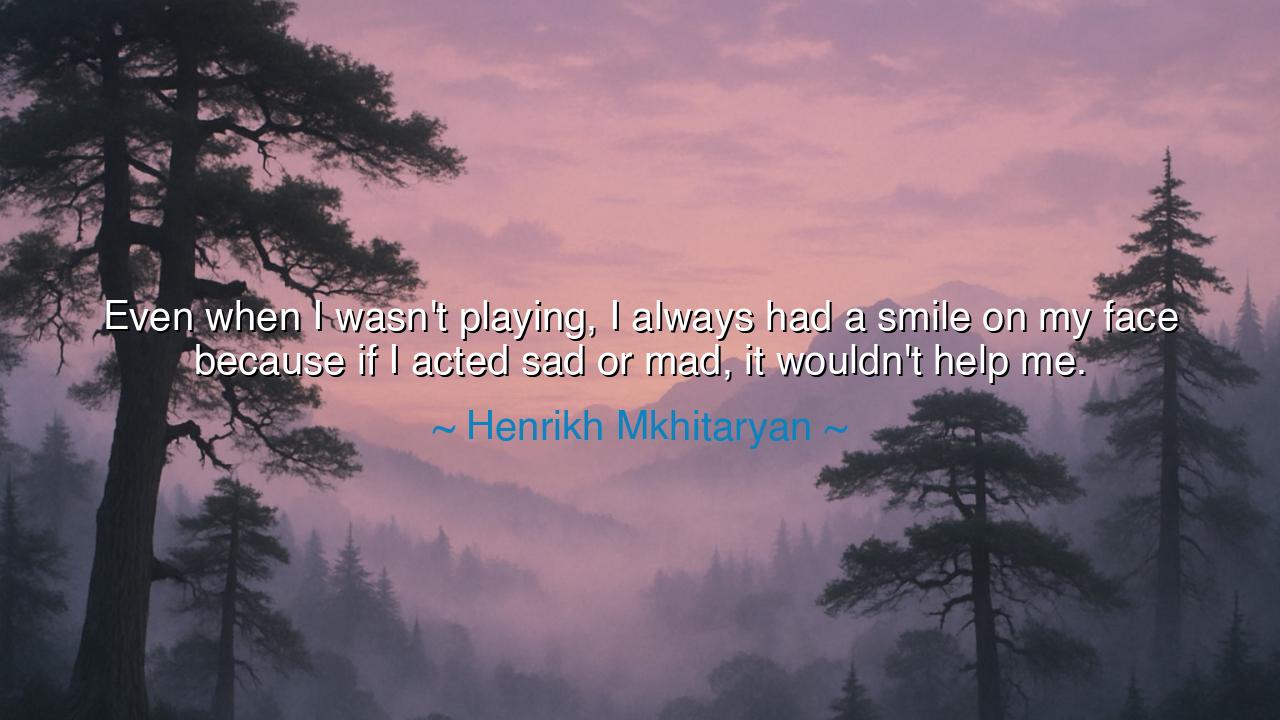
Even when I wasn't playing, I always had a smile on my face
Even when I wasn't playing, I always had a smile on my face because if I acted sad or mad, it wouldn't help me.






The words of Henrikh Mkhitaryan carry the quiet discipline of a warrior who has known both triumph and disappointment: “Even when I wasn't playing, I always had a smile on my face because if I acted sad or mad, it wouldn't help me.” This is not the boast of one who never suffered, but the testimony of one who endured the sting of being left aside and chose to answer it not with despair but with resilience. His saying reveals an ancient wisdom: that attitude is a weapon, and the countenance of the soul shapes the destiny of the man.
To wear a smile when the heart is burdened is not hypocrisy, but strength. It is to refuse to let circumstances dictate the state of the spirit. The untrained soul, when denied its desire, falls into bitterness, anger, or sorrow, and in doing so deepens its own wounds. But the disciplined soul understands that sadness and anger change nothing, while joy—even if chosen in defiance of hardship—keeps the spirit free and the future open. Mkhitaryan teaches that the greatest victories are often won not on the field, but in the unseen battles of the heart.
History itself echoes this truth. Consider Nelson Mandela, who endured long years of imprisonment. Many would have emerged from such chains broken, consumed by rage. Yet Mandela smiled, laughed, and spoke with warmth even of his captors. That smile became his shield, and when freedom came, it transformed him into a leader who could heal a nation. In the same way, Mkhitaryan’s choice to smile in silence, even while benched, reflects this heroic principle: that one’s inner fire need not be extinguished by outer circumstance.
The words also carry a warning. To give yourself to anger or sorrow in times of disappointment is to waste energy on what cannot be changed. Anger clouds the mind, sadness drains the body, and both make the struggle heavier. But a smile, even if born from will rather than feeling, keeps the spirit light. This is why the ancients counseled equanimity: the Stoic philosophers taught that while we cannot control what happens, we can control how we respond. Mkhitaryan’s wisdom is a living echo of that same teaching.
Yet this choice is not easy. It is forged in discipline, in the daily practice of gratitude and perspective. For when others play and you remain on the sideline, the temptation is great to give in to despair. But he who smiles then, who maintains dignity in disappointment, prepares himself for the day when opportunity returns. A man who keeps bitterness at bay keeps his sword sharp and his heart ready. Thus, when his chance comes again, he is not burdened by past sorrows but strengthened by past resilience.
The lesson, then, is clear: when life denies you the role you desire, do not waste yourself in sulking or wrath. Instead, choose the smile. This is not weakness but a declaration of courage, a refusal to let misfortune command your spirit. Remember that every struggle is temporary, every setback an anvil upon which the soul may be shaped.
Therefore, let all who hear these words act with intention. When disappointment comes, resist the urge to complain or collapse. Instead, smile. Not because all is well, but because you choose to stand strong until it is. Smile to remind yourself that anger will not change tomorrow, but hope will. In this way, like Mkhitaryan, you will endure with dignity and rise when your moment returns.
Carry forward his wisdom: “Even when I wasn't playing, I always had a smile on my face…” May it remind you that your spirit is sovereign, that no bench, no setback, no silence has the power to conquer the one who chooses joy as his armor.






AAdministratorAdministrator
Welcome, honored guests. Please leave a comment, we will respond soon